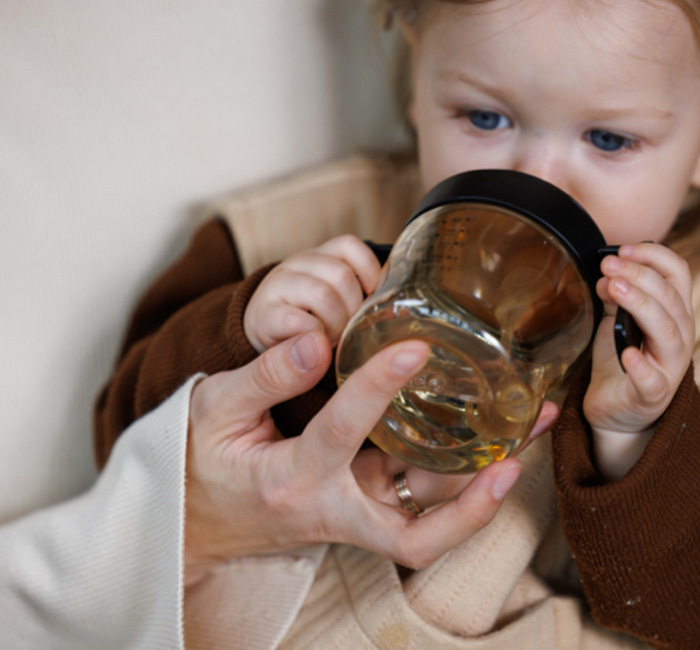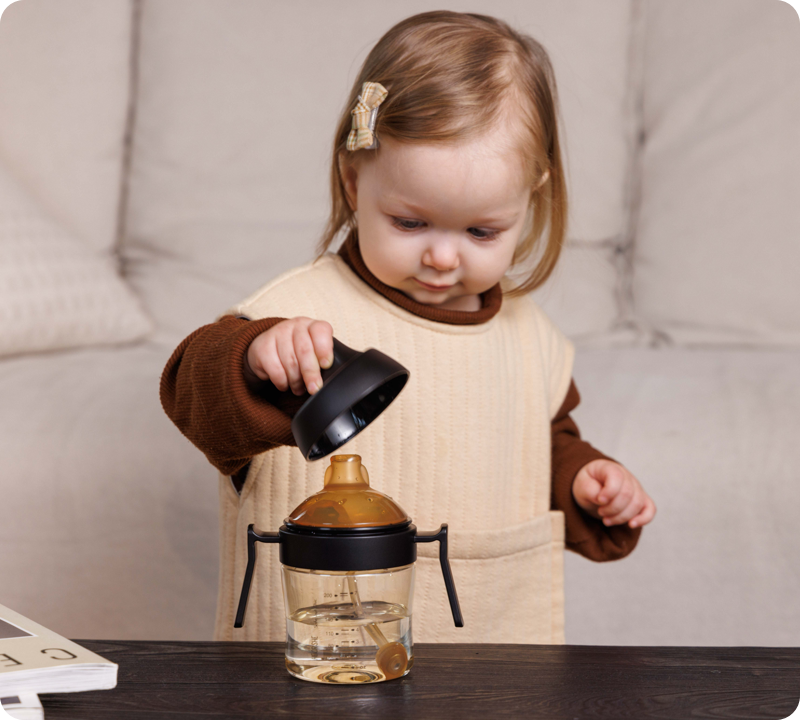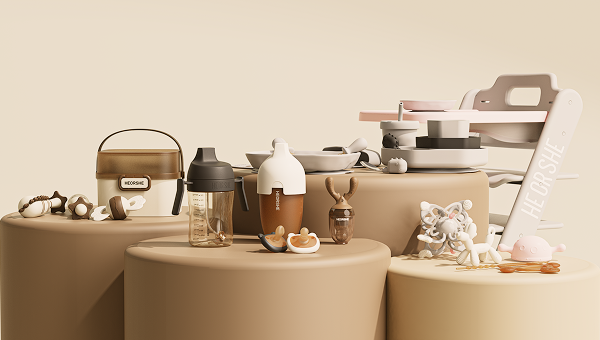Transitioning your little one from bottle to sippy cup is an exciting, but sometimes tricky milestone. For both parents and toddlers, this step signifies a shift in independence, and while it’s a big achievement, it’s not always an easy one. Choosing the best sippy cup to transition from bottle can make all the difference in the world when it comes to your child’s comfort and confidence in this new phase.
In this guide, we will explore a variety of sippy cups that help make the transition from bottle seamless, focusing on the features that make them stand out. Whether you’re looking for no spill sippy cup, ergonomic designs, or age-appropriate features, we’ve compiled the top picks to guide you through the process of finding the perfect sippy cup for your toddler.
Why Is the Transition from Bottle to Sippy Cup Important?
Before we dive into product recommendations, it’s important to understand why this transition matters. At first glance, it might seem like a small step—just another change in a toddler’s routine. But the truth is, the switch from bottle to sippy cup is one of the most important developmental milestones during the early years.
Developmental Benefits of Transitioning from Bottle to Sippy Cup:
- Oral and Motor Skills Development: Drinking from a sippy cup requires different muscle movements compared to using a bottle. Babies have to learn how to sip, tilt the cup, and sometimes even suck on a straw. These motions help develop coordination and fine motor skills, which are essential as your child continues to grow.
- Promoting Independence: A sippy cup helps children take more responsibility for their drinking, which is empowering. Being able to hold their own cup fosters a sense of independence and self-sufficiency.
- Teeth and Oral Health: Extended use of bottles can contribute to dental issues like tooth decay, especially when the bottle is used frequently throughout the day or night. Transitioning to a sippy cup—especially by age one—can help prevent these issues. It also encourages better oral hygiene by reducing the time liquid (especially sugary liquids) stays in contact with teeth.
- Safety Concerns: Prolonged bottle use can also increase the risk of ear infections, particularly if your child falls asleep with the bottle in their mouth. Transitioning to a sippy cup helps eliminate this risk by promoting a more upright drinking posture.
Ultimately, this transition is more than just about convenience for parents—it's about supporting your child's development and helping them grow into more independent and capable toddlers.

Key Features to Look for in the Best Sippy Cup to Transition from Bottle to Cup
When it comes to selecting the best sippy cup for transitioning from a bottle, there are a number of important factors to consider. These features not only impact your toddler’s comfort but also how successful the transition will be.
1. Spill-Proof Technology
One of the most essential features of a good sippy cup is a spill-proof design. As your child learns to hold and drink from a cup, accidents will happen. A no spill sippy cup ensures that your little one can practice independently without making a mess.
Look for cups with built-in valves or one-piece lids that prevent spills, even if the cup is turned upside down. This technology is particularly useful when you’re out and about, as it eliminates the need to worry about your child’s drink spilling in their car seat or on the floor.
2. Ergonomic Handles
Handling a cup properly is one of the key challenges during this transition. Choose a sippy cup with ergonomic handles that are easy for tiny hands to grip. These handles provide a better sense of control, which is especially helpful for younger toddlers who are still mastering the art of holding and drinking from a cup. Most sippy cups have handles that are designed for easy gripping, but some cups offer contoured or non-slip handles for additional stability.
3. Soft or Hard Spouts
The choice between a soft or hard spout depends largely on your child’s preference. Soft spouts are more similar to bottle nipples, making them an excellent choice for babies who are still familiar with the sucking motion. However, as your child becomes more accustomed to using a sippy cup, you might want to switch to a harder spout or a 360-degree drinking edge. These harder spouts encourage your toddler to sip more like they would from a regular cup, promoting more advanced drinking skills.
4. Material Safety
Safety is always a priority when choosing baby products. Ensure the sippy cup is made from BPA-free materials. BPA (Bisphenol A) is a chemical that has been linked to various health concerns, so it’s important to select cups that are free of this substance. Look for labels that specifically state that the product is BPA-free, or better yet, choose cups made from safer alternatives like stainless steel or glass.
5. Ease of Cleaning
Sippy cups can have multiple parts, such as spouts, valves, and lids, which can make them difficult to clean. Look for cups that are dishwasher-safe to save you time and effort. Additionally, some cups have fewer intricate parts, which makes them easier to clean by hand. Choosing a sippy cup that is easy to clean will ensure you can keep it hygienic, and it will also make your life simpler when dealing with multiple cups throughout the day.
6. Age-Appropriate Design
Your child’s developmental stage is key when choosing a sippy cup. Some sippy cups are better suited for infants just starting to wean off bottles, while others are designed for toddlers who are more experienced with self-feeding. Pay attention to the manufacturer’s age recommendations and choose a cup that aligns with your child’s needs.
Top Picks for the Best Sippy Cup to Transition from Bottle to Cup
With all the factors in mind, let’s explore some of the top picks for the best sippy cup to transition from bottle to cup. These sippy cups stand out for their ease of use, quality, and functionality.
1. HEORSHE Dental-Care Sippy Cup
Best for: Babies who need a smooth transition from bottle to sippy cup.
The HEORSHE Dental-Care Sippy Cup is an excellent choice for transitioning from bottle to sippy cup. This cup has a soft spout that closely mimics the feel of a bottle nipple, making it a familiar transition for babies who are used to the bottle. It also features ergonomic handles for easy gripping and a spill-proof design.
- Soft spout is gentle on gums, making it ideal for younger toddlers.
- Spill-proof design helps keep messes at bay.
- Handles are perfectly sized for little hands to hold.
- BPA-free and easy to clean, even for parents with busy schedules.

2. Munchkin Miracle 360° Trainer Cup
Best for: Toddlers ready for a more advanced transition.
The Munchkin Miracle 360° Trainer Cup is a standout product that makes the transition from bottle to sippy cup both fun and easy. This cup uses an innovative design that allows your toddler to drink from any side of the rim, just like a regular cup. When your child stops drinking, the cup seals automatically to prevent leaks—making it one of the best no spill sippy cup on the market.
Pros:
- 360-degree drinking edge encourages proper sipping technique.
- Spill-proof design ensures no messes, even when tipped over.
- BPA-free and easy to clean.
- Available in multiple sizes and colors, so you can find the perfect fit for your toddler.
- Encourages transitioning to a regular cup by mimicking the actions of drinking from a standard glass.
Cons:
- Some parents report that it can be difficult to get the flow of liquid started when the cup is new.
3. Nuby No-Spill Soft Sipper Cup
Best for: Parents seeking a durable, spill-proof cup for younger toddlers.
The Nuby No-Spill Soft Sipper Cup is designed with both toddlers and parents in mind. It features a soft silicone spout that makes sipping comfortable for little ones, while the spill-proof valve ensures no messes. This cup is ideal for babies transitioning from a bottle but still needing a soft, familiar experience.
Pros:
- Soft, easy-to-sip spout that won’t hurt your baby’s gums.
- Leak-proof technology ensures a mess-free experience.
- BPA-free, and dishwasher safe for quick and easy cleaning.
- Durable construction that can withstand drops and rough handling.
Cons:
- The spout can sometimes get clogged, requiring regular cleaning to keep the cup functioning properly.
4. Contigo Spill-Proof Kids Water Bottle
Best for: Older toddlers who are almost ready for a regular cup.
For toddlers who are almost ready to graduate to regular cups, the Contigo Spill-Proof Kids Water Bottle is an excellent choice. This bottle features a convenient one-handed pop-up spout that allows toddlers to drink easily, while the spill-proof design ensures no messes.
Pros:
- Pop-up spout is easy to open and close, making it perfect for toddlers on the go.
- Spill-proof technology ensures a mess-free experience.
- Wide mouth for easy filling and cleaning.
- BPA-free and dishwasher-safe.
Cons:
- The hard spout may be a little difficult for younger toddlers to manage if they are just starting out with sippy cups.
Conclusion
Choosing the best sippy cup to transition from bottle depends on your toddler's age, developmental needs, and preferences. Whether you’re looking for a no spill sippy cup to reduce messes or a soft spout design to ease the transition, there’s a sippy cup that fits your needs. The options listed above are among the top-rated and most trusted cups, offering a balance of functionality, safety, and convenience for parents and toddlers alike.
Make sure to consider the age, skill level, and specific needs of your child to select the best sippy cup for this important transition. With the right cup, your toddler will feel empowered and ready to take the next step in their development!


